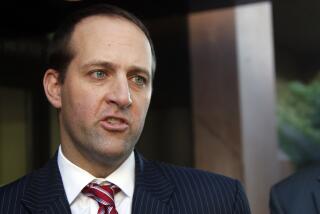Pair’s Nonconformist Ways Led to Extortion Charges, Attorney Says
- Share via
The prosecution of two former aerospace technicians charged with sending extortion letters to prominent Lancaster residents stems from a bias against the defendants because they are considered eccentrics, a defense attorney argued Monday in San Fernando Superior Court.
“They are different, they are unique,” said defense attorney William A. Clark during closing arguments in the attempted extortion and conspiracy trial of his client, Richard Faroni, and co-defendant Roman Makuch. Faroni’s background “might make him appear to be what some would call a ‘nerd,’ ” Clark said.
Clark said the readiness of prosecutors and investigators to believe the two men’s guilt stems from a “type of bias more subtle than ethnic background or skin color. . . . I don’t think there’s a reasonable doubt in this case. I think the doubt is so vast it’s ridiculous.”
The men have been described by witnesses as bright loners fascinated with electronics, guns, investigative work and a plan to build a movie studio in the Kern County desert.
In closing arguments, Deputy Dist. Atty. Stephen L. Cooley said Judge Ronald S. Coen already ruled in the prosecution’s favor on the central issue last month when Coen rejected a defense motion to throw out the case because of insufficient evidence.
Cooley said the defendants’ denials were not convincing, describing the testimony of Makuch and Faroni as “vague and disingenuous . . . designed to soften the impact of hard evidence.”
Although Cooley has conceded that the evidence is circumstantial, he has said it shows that Makuch and Faroni gathered personal information on at least 267 people through surveillance and public documents, then prepared the mass mailing sent in late 1988. The “pay-or-die” letters demanded millions of dollars, but no money was ever collected. Makuch and Faroni were arrested in Las Vegas by investigators acting on a tip.
Faroni, a former Army communications specialist, and Makuch, a former Marine, face up to eight years in state prison if convicted. They have spent more than a year in jail and more than a month in trial before Coen, who is hearing the case without a jury at the request of defense attorneys.
Both sides expect to finish closing arguments today. In testimony Monday, Fay Smith, a friend of the defendants called to testify by the prosecution, said she did not remember Makuch and Faroni saying they were conducting surveillance activity in the summer of 1988. She also said she did not recall recounting such conversations to detectives, though an investigator later testified that she did.
Smith confirmed that on Oct. 31, 1988, Faroni left a phone message asking her to call him in Connecticut, then discussed “nothing of substance” with her when she returned the call. That is significant because prosecutors believe the letters were mailed by an accomplice on that date and that Faroni made the call only to establish an out-of-town alibi.
More to Read
Sign up for Essential California
The most important California stories and recommendations in your inbox every morning.
You may occasionally receive promotional content from the Los Angeles Times.













